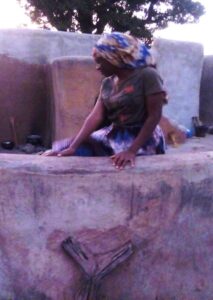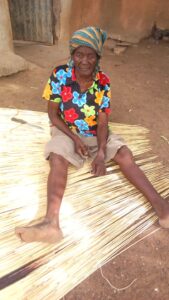Joseph Aduedem (Pungsa-Bilinsa, Sandema)

Joseph Aduedem
STRANGER IN HER OWN LAND:
THE POSITION OF WOMEN IN BULSA SOCIETY
In recent times, interest in the rights of women has been on the rise. While most Christians (if not all) and other gender rights activists think that God created man and woman as equals, this view seems to be unfamiliar with most cultures not excluding the biblical worlds themselves. Thus, the general situation has been a masculine domination in almost all cultures right from the patrilineal societies of the Ancient Near East of which Israel was part, down the ages to the Ghanaian and for that matter the Bulsa society. Biblical phrases like “…not counting women and children” (Mt 14:21; 15:38) and the Pauline teaching that women should be silent in liturgical assemblies (1 Cor 14:34-35) seem to have brought to bear the patriarchal dominance of the biblical world of the time. Well, this write-up is not a comparative study and would therefore be limited to and interested in looking at this situation from the Bulsa worldview, taking into consideration how this side-lining of women has declared Bulsa women strangers in their own land of Buluk.
THE BULSA WORLDVIEW
The girl child right from birth up to her last moment on earth in Buluk is always looked at as nuri yeri denoa (literally: belonging to someone’s house). This placement or consideration of the female child is irrespective of whether she lives in her father’s house or her matrimonial home. Thus, she is said to belong to someone in her father’s house and when she is married, she is considered belonging to someone’s house again. Below then is how this view is manifested in both her father’s house and that of her matrimonial home. It should be added that what is discussed below is not exhaustive, neither is it based on researched data but something I have personally heard of and witnessed while growing up and living in Buluk.
AT HER FATHER’S HOUSE

A young lady climbing a kingkangi (wall) in Chuchuliga
As mentioned already, the side-lining of the female gender occurs not exclusively in her father’s house. The following are therefore some of the things that manifest this side-lining. First of all, at her father’s house, she is not counted among her siblings as a member of the house particularly in the situation where she has married. Well, this makes sense when we substitute the “he” with “she” in Mt 19:5, such that it reads, and she leaves her mother and father and is joined to her husband…. In this case, it becomes “she is said to belong to her husband’s house.” As such, a number of things are denied her even if she is not married yet. For instance, she cannot sit in the kusung (hut) among the elders for deliberations and decision-making. Her place is the courtyard (dabiak) and it is not uncommon in Buluk to hear the phrase nipooma miena yiri jo dok (all the women should enter inside) when certain discussions or rituals are to take place. In fact, when it comes to sitting in meetings at the kusung, a three years old male child is allowed and preferred to a thirty years old female descendant of the house.
Not only that, a female child is not entitled to inheritance per Buluk standards. Inheritance in Buluk is generally according to the principle of seniority of generation and age (Kröger, 1982, p. 85) and this is according to the male line alone. As such and as I cited Kröger in Aduedem (2018), ‘wives, daughters-in-law and female children are not considered much in a traditional Builsa household setting “because women make no claim to succession”’. Even without dealing with the topic of women in their matrimonial home, the above suffices to state that nowhere is a woman entitled to inheritance.
Another thing is that a woman (female child) cannot perform sacrifices. There is a common saying in Buluk that; nipok kan kaab bogluwa (a woman or female does not perform sacrifice). Well I really did not ask for an explanation to this prohibition, and where a woman or lady is having a personal god known in Buluk as her wen/tuntueta wen, somebody performs sacrifices on it on her behalf, unlike her male siblings who do it themselves. Thus at her father’s house in the case I witnessed, it was the father who performed the sacrifice on her behalf. In the case of her matrimonial home, either her husband or her son performs the sacrifice on her behalf. Whichever the situation is, the bottom line is that she cannot and does not perform sacrifice on her own tuntueta wen, not to talk of any other god particularly ancestral gods.
Also, whereas children (sons) of one’s brother are your sons by custom and by right in the Bulsa context and therefore may perform certain functions as if they were your biological children, the children of one’s sister(s) are nephews in the proper sense of the word. Thus in Buli, your brother’s children are simply referred to as your sons, while the children of your sister are called ngesingsa or tua bisa. As I cited Kröger in Aduedem (2019), I mentioned that ‘sons include the brothers’ male children because, the “English word ‘nephew’ is never used by Bulsa for their brothers’ sons.”
The last thing worth mentioning about this is the fact that if a lady refused to marry or has divorced and remains in her father’s house, she is ritually regarded as a male. Thus, the funeral rites of a yeri lie who has not married before or came to die in her father’s house are performed like a male’s funeral: for instance the mat at the kumsa rites is not sent out and put under a tree but remains in the kraal (nankpieng), there is no rest day (vuusum dai) before the kpaata dai and so on. A yeri lie is a male in effect when it comes to rituals related to their status. This implies that she has changed her gender into that of masculine in ritual language once she remains in the father’s house.
AT HER MATRIMONIAL HOME

An old lady weaving a straw mat (tiak peka) in Wiaga
At her matrimonial home, nothing really changes about the “strangerness” of a woman. Like the situation in her father’s house, she is considered as belonging to her father’s house and so does not really take part in decisions making. She is not allowed to sit in the kusung for discussions, her place is inside and she is not permitted to know family secrets because she is a stranger. Actually because divorce was (is) not all that difficult in the context of Buluk, the woman is seen to be someone who may walk out at any moment. This puts her in a temporal status in relation to belonging to her matrimonial family and this comes with its accompanying consequences.
As mentioned earlier under her place in her father’s house, a woman in her matrimonial home is not entitled to inheritance, too. In most situations where the woman is industrious, she usually would owe property in the name of her child (son). As such, though the things were acquired by her, it is understood that they were acquired in the name of her child or children. It is therefore not uncommon to see or hear women buying things such as fowls, goats, sheep, etc. for their children as little as one year old. These might belong to the woman in question, but they are for and in the name of the child.
In relation to the Marriage institution, she more or less has no sexual rights (in terms of going out once married but the husband may go out). Sexual relationship outside of the marriage for her comes with ritual implications whereas her spouse can marry again, is customarily justified sleeping with an unmarried woman and can be in an extramarital relationship with a widow without any of these being a problem. In other words, unlike a man who can still be in extramarital relationships, a woman can never have an affair outside her marriage (be it with a married person or not) and if she does, it is considered an adultery and ritual cleansing must take place. This is the extent to which women are looked at and treated, and truly she becomes a stranger on her own land.
CONCLUSION
As we come to the conclusion of this write-up, it should be noted that it is never the intention of the author to look down upon the feminine gender, nor to paint a negative picture about the well-deserved reputation of the Bulsa as a tribe. The concern however is that with civilisation and enlightenment, cultural aspects that are unduly disadvantageous should be relooked at. That there are women rights campaigners already in our societies is a call on all to help in this regard.
It is also important to be aware that society is changing and therefore what we could do in the past freely might not apply today. This is particularly in relation to sexual rights under the marriage institution mentioned above. From a personal point of view, that a woman cannot have extra marital affair should be applicable to men, too. After all, as the adage goes, “what is good for the goose is good for the gander”.
REFERENCES
1. Aduedem, Joseph, Builsa Funeral Rites: Are Builsa Christians (Catholics) Supposed To Perform? [Unpublished work, 2019].
2. Aduedem, Joseph, “The Builsa Ghost: A Real Creature Or A Mythical Creature?”, Memoir, St Victor’s Major Seminary, Tamale, 2018.
3. Kröger, Franz, Ancestor Worship among the Bulsa of Northern Ghana. Religious, Social and Economic Aspects. Hohenschäftlarn near München: Klaus Renner Verlag, 1982.
4. Kröger, Franz, Buli-English Dictionary. Münster: Lit Verlag, 1992.
5. The New Jerusalem Bible, Study Edition, London, Darton: Longman & Todd Ltd., 1994.
- Editorial
- Events
- Ghanatta Ayaric: Prof. S. Abanteriba awarded Medal of the Order of Australia (OAM)
- Franz Kröger House – Azantilow Senior High School, Sandema
- Franz Kröger: The Parliamentary and Presidential Elections 2020
- Franz Kröger, Robert Asekabta and Kennedy Azantilow : Electing New Bulsa Chiefs (2021-2022): Qualifications of a chief, elections in Fumbisi, Doninga, Kadema and Bachonsa
- Kennedy Azantilow and others: Feok Festival (and Associated Events) 2022
- Augustine Atano: Feok Festival 2020 (Review)
- Augustine Atano: The duration of the Feok Festival
- Augustine A. Atano: Feok Festival 2021 (Review)
- Kennedy Azantilow: Feok Festival 2022
- Franz Kröger: Who on Earth is Interested in the Bulsa?
- Franz Kröger: Obituaries
- Margaret Arnheim: Maaka in Buluk
- Martin Anbegwon Atuire: Bleeding Palimsests: Heritage Tourism…
- Kwesi Amoak: Review of Dr. Caesar Atuire’s “Philosophical Underspinnings of an African Legal System
- Joseph Aduedem: A Stranger in Her Own Land – The Position of Women in Bulsa Society
- Joseph Aduedem: Kisuta (taboos): Their Origins and Significance among the Bulsa
- Joseph Aduedem: Abunoruk maari Asuom / Abunoruk helped Asuom
- Joseph Aduedem: Yog Wiik
- Franz Kröger: The First Picture of an African Woman
- Franz Kröger: Recent Bulsa Publications
- Commentaries in the Internet Edition of Buluk
- Abdul-Rauf Akan-mwanatechaab: Brothers in Skirt
- John Agandin: The Fires Eat the Land at Home
- Bulsa Cuisine
- Ghanatta Ayaric: The New Masim Rice-Mill in Fumbisi